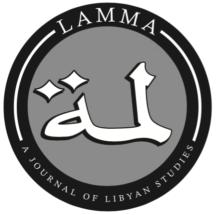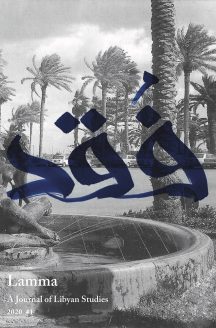Editors-in-Chief: Adam Benkato, Leila Tayeb, and Amina Zarrugh
 Lamma is an academic journal that aims to provide a forum for understanding critically the complex ideas, values, social configurations, histories, and material realities in Libya. Recognizing, and insisting on, the urgent need for such a forum, we give attention to as wide a range of disciplines, sources, and approaches as possible, foregrounding especially those that have previously received less scholarly attention. This includes, but is not limited to: anthropology, art, gender, history, linguistics, literature, music, performance studies, religion, sociology, politics, and urban studies in addition to their intersections, their subfields, and places in between. The journal particularly welcomes articles that adopt innovative critical, theoretical, and postcolonial approaches. Lamma is a space where these fields interact and draw from one another. It is a platform where scholars and students from inside and outside of Libya gather to redefine and reshape “Libyan Studies.” For these reasons the journal takes its name from the Arabic word lamma: “a gathering.”
Lamma is an academic journal that aims to provide a forum for understanding critically the complex ideas, values, social configurations, histories, and material realities in Libya. Recognizing, and insisting on, the urgent need for such a forum, we give attention to as wide a range of disciplines, sources, and approaches as possible, foregrounding especially those that have previously received less scholarly attention. This includes, but is not limited to: anthropology, art, gender, history, linguistics, literature, music, performance studies, religion, sociology, politics, and urban studies in addition to their intersections, their subfields, and places in between. The journal particularly welcomes articles that adopt innovative critical, theoretical, and postcolonial approaches. Lamma is a space where these fields interact and draw from one another. It is a platform where scholars and students from inside and outside of Libya gather to redefine and reshape “Libyan Studies.” For these reasons the journal takes its name from the Arabic word lamma: “a gathering.”
There is a wide range of research on Libya that deserves to be represented and disseminated to scholars and students both in Libya and in Europe and North America, but a forum that brings them all together does not really exist. Such a forum would actively reach out to find them and bring their research to light, ultimately working to shape and define what “Libyan Studies” is. Furthermore, there is great interest among Libyan students both in Libya and abroad in accessing research about their country in order to fuel and motivate their own studies. Many of these students struggle to find accessible research on topics of contemporary relevance. Now is a critical time in the history of Libya, with instability and conflict threatening not only the country’s prospects for a peaceful and productive future, but also efforts to broaden educational and research horizons in tandem with Libyan scholars and students. It is imperative that we find the means to support these efforts.
We believe that access to research is not the privilege of a few but the right of all and that knowledge production should be inclusive. Besides research articles and reviews of important publications, we are also open to including relevant translated and original literary work, and offer the journal as a platform for the publication of specialized workshop papers or guest-curated collections.
Individual articles are archived in collaboration with the University of California’s eScholarship platform.


